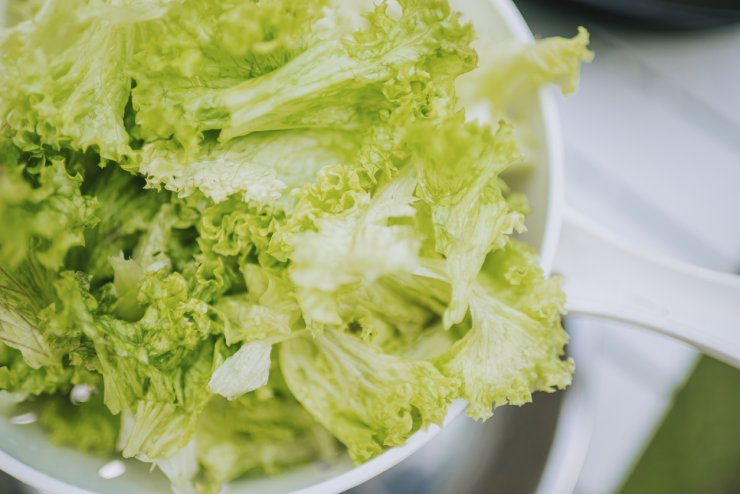
table top view of cleaned up leaf vegetable in bowl

Healthy lettuce in a bowl
Lettuce makes great salad, and it’s also a salad of nutrients! Rich in antioxidants and plant compounds, lettuce can protect your heart, increase good (HDL) cholesterol, lower your blood pressure, protect against cancer, and help control blood sugar. The vitamin C in lettuce helps boost your immune system and helps neutralize free radicals in your body. And your body can’t store vitamin C, so you need to be sure to get your daily requirement.
Here are some of the other ways lettuce contributes to good health.
Heart health
Heart disease is the most common form of death worldwide. Consumption of fruits high in vitamin C, like lettuce, has been linked to reduced heart disease.
The high potassium content in some lettuce varieties, such as Romaine, butterhead, and leaf lettuce, also contribute to heart health.
The flavonoids in lettuce may help reduce women’s risk of ischemic stroke.
The fiber in lettuce can help decrease blood cholesterol levels, and the essential oils in lettuce (in the peel) can help fight LDL (bad) cholesterol.
Anemia Prevention
Anemia is iron deficiency. It’s most common in pre-menopausal women. The darker lettuces have higher iron content.
Cancer prevention
Antioxidants found in lettuce may help trap free radicals in the body, preventing the onset of some cancers.
Weight loss
Several studies have shown that people who eat a salad before a meal tend to consume fewer calories overall, making lettuce a good choice to start a meal—just go easy on the salad dressing. Lettuce can also work as a stand-in for bread when you’re making your favorite sandwich. Think of making a roll-up instead of a regular sandwich, and substitute Romaine leaves for the bread. That’s an instant savings up to 200 calories!
Eye health
Vitamin A is essential in protecting eye health, as is beta-carotene. Lettuce contains both these essential compounds.
Better sleep
Some compounds in lettuce have been shown to help people get a better night’s sleep. The white fluid you see in lettuce when you cut or break lettuce leaves is called lactucarium. This compound has relaxing and sleep-inducing properties.
Pregnancy health
Folate is essential for the healthy development of babies in order to prevent neural tube defects, such as spina bifida. Prenatal vitamins include folate (also called vitamin B9), but lettuce is a great natural source of this essential vitamin.
Skin health
The vitamin C in lettuce may contribute to healthier skin—reducing the development of wrinkles and contributing to more hydrated skin and fewer blemishes.
Lettuce hazards
Some commercially-grown lettuce has had chronic contamination problems in recent years, especially Romaine lettuce. Breakouts of Salmonella and E. coli have prompted nationwide recalls. The FDA says they can trace a lot of those issues back to the plants being watered with contaminated water.
Another health concern about lettuce—especially Romaine—is how the plant absorbs heavy metals from the soil, including lead, cadmium, chromium, and mercury. The best way to ensure contamination-free Romaine is to grow your own in soil that’s been tested for contaminants.
Did you know that lettuce was so healthful? Please tell us how you use lettuce.



